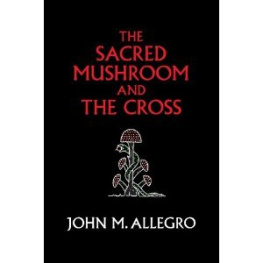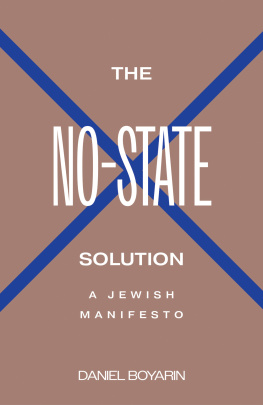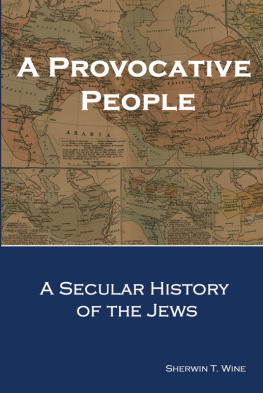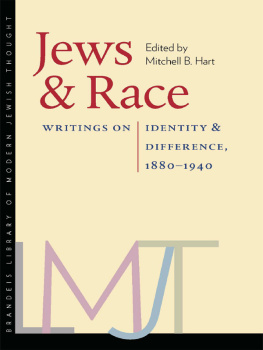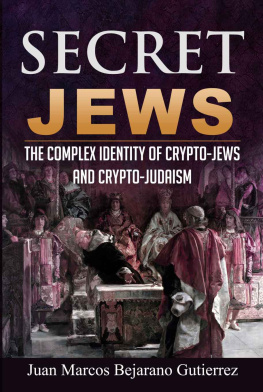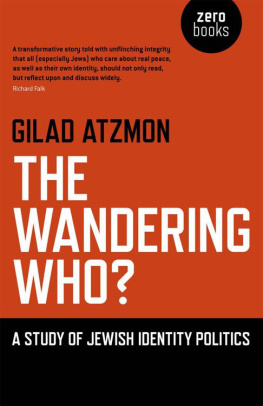Title Page
THE CHOSEN PEOPLE
A Study of Jewish History f rom the Time of The Exile Until The Revolt of Bar Kocheba. Sixth Century B.C. to Second Century A.D.
SECOND EDITION
John M. Allegro
Publisher Information
Published in 2015 by
ROUSSEAU, ETC.
Piketon, Ohio
www.rousseau-etc.com
Digital edition converted and distributed in 2015 by
Andrews UK Limited
www.andrewsuk.com
Original text by John Marco Allegro and introduction to second edition by James M. Donovan
Cover design by Cleiton Pereira Carvalho
Cover photograph: sunset sky www.freebigpictures.com
Acknowledgments from the first edition:
Messrs. William Heinemann Ltd., for permission to quote from the English translations in their Loeb editions of Josephus; Messrs. Edward Arnold for the quotation from E. Bevans The House of Seleucus, i (1902) p. 207, in ch. IV. Biblical quotations are mostly from the Revised Standard Version by permission of Thomas Nelson and Sons Ltd., and from the Authorised Version of the Apocrypha.
All rights reserved. No part of this publication may be reproduced, stored in a retrieval system, or transmitted, in any form or by any means without the prior written permission of the publisher, nor be otherwise circulated in any form of binding or cover other than that in which it is published and without a similar condition being imposed on the subsequent purchaser. Any person who does so may be liable to criminal prosecution and civil claims for damages.
Introduction to the Second Edition
The bibliographic record for the Doubleday edition of John Allegros The Chosen People [TCP] mirrors the complex intellectual biography of its author. While the title page records the books official subtitle, A Study of Jewish History from the Time of the Exile until the Revolt of Bar Kocheba, Sixth Century B.C. to Second Century A.D. , the cover strikes a different tone: A Controversial History of the Jews . As the dual headings suggest, throughout his career Allegro deliberately tried to span, not always successfully, the chasm separating the community of scholars and the audience of popular readers. On the one hand the academic establishment offers formal legitimacy and ego-vindicating recognition, intangibles every student has been trained to value over crass material gain. But the true power to drive political funding and bureaucratic support for research arises from securing mainstream interest. Allegro appreciated this fact more than his peers did, even if he was not always adept at finding an efficient balance between respectability and popularity. In his eagerness to bring attention to important projects he could be too hasty in appealing to laypersons at the cost of alienating the experts.
The Chosen People , Allegros attempt to uncover the historical sources for the worlds enduring anti-Semitism, bears the marks of this wish to appeal to two disparate readerships. Allegros fluent command of the relevant primary literature is more than sufficient reason for his arguments to be taken seriously. He knows whereof he speaks. He spins the details, however, into a story more akin to a gripping potboiler of palace intrigue and political machination than to a dry recitation of long-forgotten events. Relying upon in-text citations, Allegro was scolded by reviewers for eschewing the fully footnoted scholarly apparatus usually found in such serious works. Yet it is arguably these concessions to the nonspecialist that make the text so compelling and ultimately more effective at conveying the authors broader lessons.
John Marco Allegro (1923-1988) is perhaps best known for his work studying the Dead Sea Scrolls. Judith Anne Brown, Allegros daughter, provides in John Marco Allegro: The Maverick of the Dead Sea Scrolls (2005) a full description of his life and intellectual journey. Allegro originally intended to receive ordination in the Methodist church, until his reflective honesty drove him to realize that he could not urge other people to adhere to the tenets of the faith unless he was certain about the meaning of the texts upon which the tradition stood. Such questions led him to leave the seminary and enroll instead in courses of Semitic languages. This problem of relating religious belief to deep reading of the charter texts would guide his whole career.
In 1953, while still a doctoral student, Allegro was selected as the British representative on the team to edit and analyze the recently discovered Dead Sea Scrolls. Plotting a Google Ngram of his name, we see that that initial appointment triggered the first notice of Allegro. His later impact, measured by citations in published books within the Google database, saw three peaks. Two of these, in 1957 and 1995, correspond with increased mentions of the Dead Sea Scrolls themselves, suggesting that Allegros rising profile at those times should be attributed to the ebb and flow of discussions of those ancient texts. More interesting for our purposes is that while mentions of the Dead Sea Scrolls generally declined in the early seventies, Allegro saw a spike in his popularity in 1973. Credit for this uptick must be due primarily to the publication in 1970 of his controversial work, The Sacred Mushroom and the Cross [SMC], the book that Judith Anne Brown forthrightly states ruined Johns career.
Religion, according to Allegro, is fundamentally a fertility cult endeavoring to manipulate the divine powers through ecstatic rituals involving the use of mind-altering mushrooms, specifically the Amanita muscaria , or fly agaric. This first assertion is not excessively controversial. The relationship between altered states of consciousness, whatever their cause, and religious ritual has a solid scholarly pedigree. Casual perusal of my shelf yields the following random examples: I.M. Lewis ( Ecstatic Religion: A Study of Shamanism and Spirit Possession , 3 rd . ed., 2003); Gilbert Rouget ( Music and Trance: A Theory of Relations between Music and Possession, 1985); Clarke Garrett ( Spirit Possession and Popular Religion: From the Camisards to the Shakers , 1987); and finally R. Gordon Wasson ( Persephones Quest: Entheogens and the Origins of Religion , 1986). (Allegro in fact was accused of stealing his thesis from Wasson, a claim discredited by Jan Irvins The Holy Mushroom (2009).) This list could be greatly expanded; the point is that the seed idea within SMC draws upon an established tradition.
The career-killing move was how Allegro related this idea to the history of first-century Judaism. The secrets of proper cultic practice were, by definition, kept hidden, and rarely written down except in the most exigent circumstances. As he tells the story:
Such an occasion, we believe, was the Jewish Revolt of AD 66. Instigated probably by members of the cult, swayed by their drug-induced madness to believe God had called them to master the world in his name, they provoked the mighty power of Rome to swift and terrible action. Jerusalem was ravaged, her temple destroyed. Judaism was disrupted, and her people driven to seek refuge with communities already established around the Mediterranean coastlands. The mystery cults found themselves without their central fount of authority, with many of their priests killed in the abortive rebellion or driven into the desert. The secrets, if they were not to be lost forever, had to be committed to writing, and yet, if found, the documents must give nothing away or betray those who still dared defy the Roman authorities and continue their religious practices. (SMC, pp. xiii-xiv)
Due perhaps to his work on the Scrolls, which regularly used code names to refer to individuals and groups (James C. VanderKam, The Dead Sea Scrolls Today , 2 nd ed., 2010), Allegro may have been open to the possibility of similar layers within the Gospels. From that view, the rebels solution had been to concoct a coded story of a rabbi called Jesus, and invest him with the power and names of the magic drug. Christianity, SMC argues, began as a conspiracy to communicate mushroom lore through allegory and wordplay. However, the point of the hoax became forgotten: cult members took the concocted stories literally, developed them into the narrative of a new religion, and called it Christianity. With the publication of SMC, Allegro sought to restore to the world the true meaning behind the Gospels; here he thought he had found the answer to the question that first led him away from the seminary so many years earlier.
Next page

